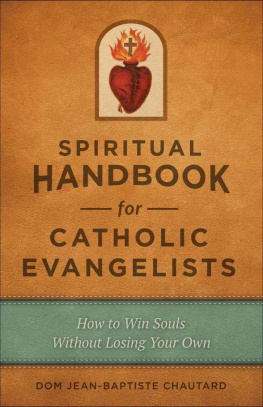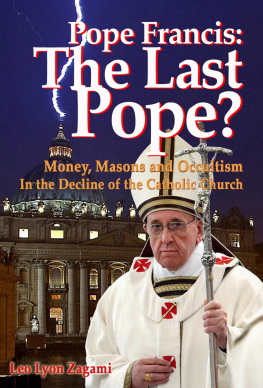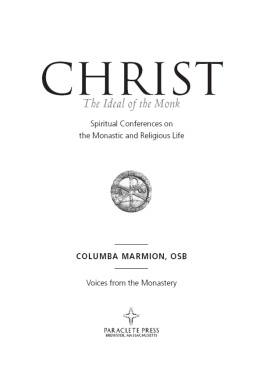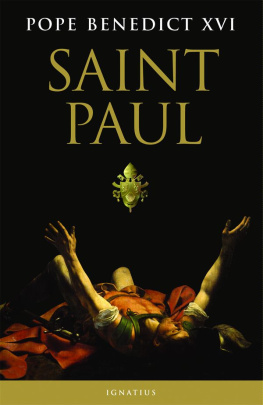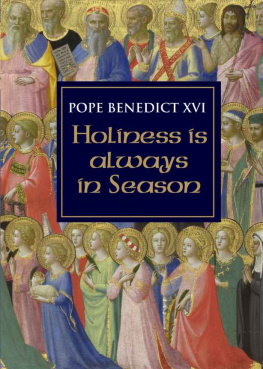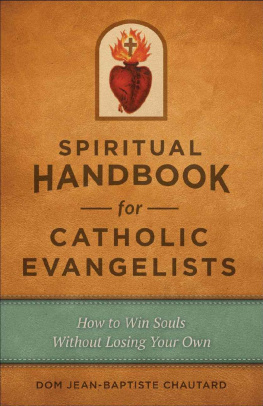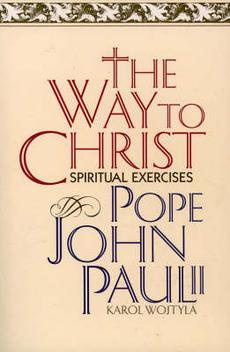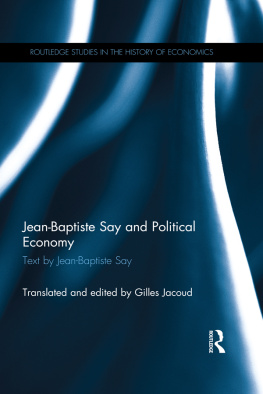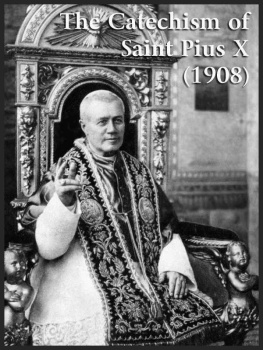Spiritual Handbook for Catholic Evangelists
How to Win Souls without Losing Your Own
Dom Jean-Baptiste Chautard
SOPHIA INSTITUTE PRESS
Manchester, New Hampshire
Spiritual Handbook for Catholic Evangelists is a slightly abridged version of The True Apostolate, third edition (St. Louis: B. Herder Book Company, 1925). This 2003 edition by Sophia Institute Press includes minor editorial revisions and uses the term apostle in place of apostolic laborer and apostolic worker.
Copyright 2003 Sophia Institute Press
Printed in the United States of America
All rights reserved
Cover design by Lorraine Bilodeau
No part of this book may be reproduced, stored in a retrieval system, or transmitted in any form, or by any means, electronic, mechanical, photocopying, or otherwise, without the prior written permission of the publisher, except by a reviewer, who may quote brief passages in a review.
Sophia Institute Press
Box 5284, Manchester, NH 03108
1-800-888-9344
www.SophiaInstitute.com
Nihil obstat:
F. G. Holweck,
Censor Librorum
St. Louis, May 29, 1918
Imprimatur:
Joannes J. Glennon,
Archbishop of St. Louis
St. Louis, May 30, 1918
Library of Congress Cataloging-in-Publication Data Chautard, J. B. (Jean Baptiste), 1858-1935.
Inner strength for active Apostles : how to win souls without losing your own / Jean-Baptiste Chautard.
p. cm.Includes bibliographical references.
ISBN 1-928832-94-6 (pbk. : alk. paper) 1. Spiritual life Catholic authors. I. Title.BX2182.3 .C47 2003
248.482 dc22200302155003 04 05 06 07 08 09 10 9 8 7 6 5 4 3 2 1

Preface
This work of Dom Jean-Baptiste Chautard, Trappist Abbot of Sept-Fons, is specially destined to benefit all persons who are regularly engaged in laboring for the salvation of souls, either directly or indirectly, in the works of both spiritual and corporal mercy. On account of its solid doctrine and wise and practical directions and counsels, it has been praised by Pope Benedict XV and recommended to the clergy and the religious by Pope Pius X, many cardinals, and numerous bishops. Published in 1912, it obtained so great a success that, four years later, in 1916, it had reached its sixth edition, and fifty thousand copies had already been sold.
We hope that this valuable work, although somewhat condensed in its English dress, will prove profitable to the apostles of our country and of other English-speaking countries. To realize this hope, we unite with its pious and learned author in offering this little work to the Blessed Virgin Mary.
O Mary Immaculate, Queen of Apostles,
deign to bless these modest pages,
and obtain that all their readers may fully understand that,
if God is pleased to make use of them
as regular instruments of His Providence,
for dispensing heavenly goods to the souls of their fellowmen,
they, on their part, should endeavor,
by their virtues and holy life,
to be intimately united to Jesus Christ, their Model.
O Mary, Mother of God and our Mother also,
bless us and our apostolic labors. Amen.

Introduction
God desires apostolic works as well as apostolic zeal
To the divine nature pertains sovereign liberality. Goodness tends to diffuse itself and to impart to others the good it enjoys.
The mortal life of our divine Savior was but a continual manifestation of His inexhaustible liberality. The Gospel shows Him sowing, on His way, treasures of love from His Heart, full of eagerness to draw mankind to the truth and the life.
Our loving Redeemer communicated this flame of the apostolate to His Church as the gift of His love, the manifestation of His truth, and the resplendent reflection of His holiness. The mystical Spouse of Christ, animated with the same spirit, continues through succeeding ages the work of the apostolate of her divine Spouse and Model.
How admirable is the universal law established by Divine Providence, that man should learn the way of salvation through the ministry of man. It pertains, says Pope Leo XIII, to the ordinary law, by which God, who best provides for all things, has decreed that men should be saved mostly through men. Jesus Christ alone shed the Blood that redeemed the world. He could have applied its virtue Himself and have alone acted directly on mens souls, as He actually does in the blessed Eucharist. But He preferred to choose cooperators among men for dispensing His benefits. And why? Without doubt it was because the Divine Majesty would have it so. But besides, He was moved to do this by His tender love for men. And if it is befitting for the ruler of a state to govern chiefly through his ministers, it is nevertheless a wonderful condescension on the part of God to associate poor creatures, like ourselves, to His labors and glory.
The Church, born on the Cross from the pierced side of the Savior, perpetuates by the apostolic ministry the beneficent and redeeming action of the Man-God. This ministry, willed by Jesus Christ, becomes the essential factor for propagating the Church throughout the nations, and the ordinary instruments of her conquests.
In the first rank are the clergy, whose hierarchy forms the framework of the army of Jesus Christ, the clergy illustrated by so many holy and zealous bishops and priests, so gloriously honored of late by the beatification of the Cur dArs.
Alongside the official clergy there arose, from the very beginning of Christianity, companies of volunteers, real corps delite, for special work, whose perpetual and luxuriant vegetation will always be one of the most manifest phenomena of the vitality of the Church.
First, in the early ages of the Church, came the contemplative orders, whose unceasing prayer and severe austerities so powerfully contributed to the conversion of the pagan world. In the Middle Ages, the preaching orders arose together with the mendicant and military orders and those devoted to the redemption of the captive Christians from among infidel nations. And lastly, the modern times have beheld the birth and labors of numerous teaching orders, missionary institutes, congregations, and societies devoted to the care and relief of every kind of misfortune, need, and disease to which mankind is subject, whether spiritual or corporal.
Moreover, at every epoch of her history, the Church has found among the laity of both sexes numerous coworkers with her clergy and religious, such as fervent Catholics in every condition and state of life, who are now legion men of action, as we may call them, ardent souls, who, uniting their forces and means in pious associations, place in the service of our Mother the Church their time, their talents, their means, and often even sacrifice their liberty and their life.
It is indeed an admirable and encouraging sight to behold the providential budding forth and blooming of apostolic activities, at the very time they are most needed, and so wonderfully adapted to the wants of the period, as is proven by the history of the Church. Every new want, every new danger to ward off or overcome invariably beholds the appearance of the institution required by the wants of the hour.
Hence, in our times we have beheld and still behold works, scarcely even thought of previously, arising around us to combat new evils, to fill new wants, such as laymens retreats, Catholic societies and clubs for various timely purposes, the Apostleship of Prayer, the Work of the Propagation of the Faith, the Holy Childhood, the Association of the Catholic Press, the Total Abstinence Societies, the Holy Name Society, the Federation of Catholic Societies, and other works, of both local and general usefulness. All these are forms of the apostolate raised up by the spirit that inflamed the soul of St. Paul: I most gladly will spend and be spent myself for your souls, and which seeks to spread everywhere the benefits of the Blood of our Redeemer, Jesus Christ.
Next page
